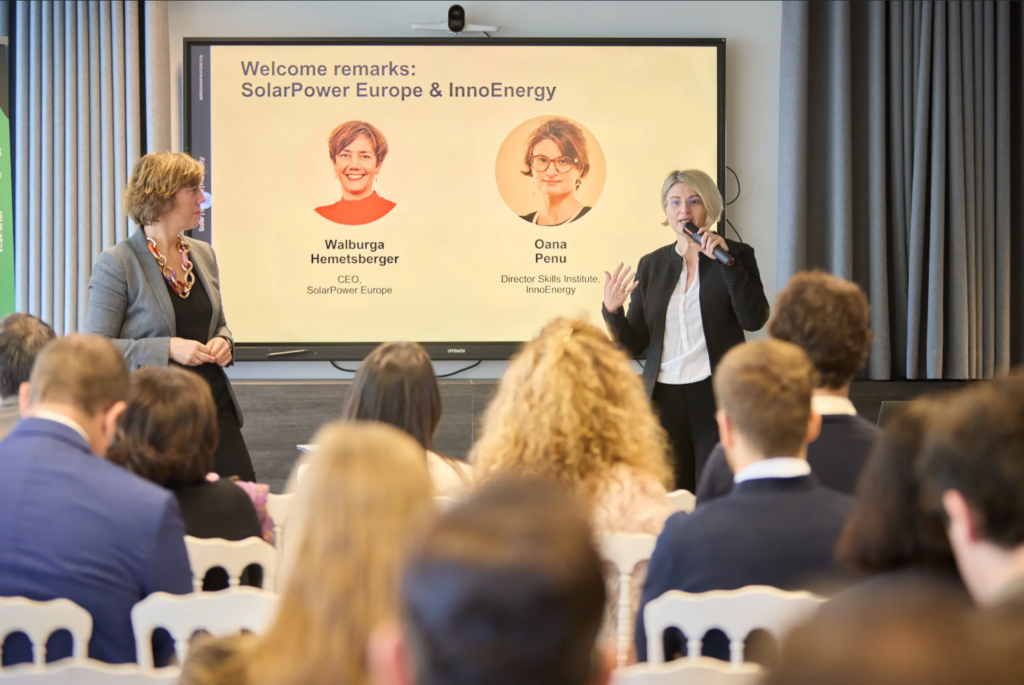By Oana Penu, Director of InnoEnergy Skills Institute
Europe is accelerating toward a green and digital economy. But one critical factor threatens to slow progress: a lack of investment in workforce skills development. The skills needed for green technology, AI, and advanced manufacturing are in high demand, yet funding to train workers remains limited and uneven. (World Economic Forum Future of Jobs Report 2025)
Europe needs to invest in upskilling and reskilling to achieve its climate goals and remain competitive in the global economy. Without this commitment, companies will face deepening skills shortages, and workers will miss out on the jobs of the future. The current lack of funding for workforce development puts both economic strength and social cohesion at serious risk.
Why Workforce Skills Development Funding Is Falling Short
For decades, governments have taken the lead in funding upskilling programs. But the pace of change today is faster than most public systems can handle. Rapid technological disruption, the shift to a net-zero economy, and changing demographics are driving new skill needs across industries. (OECD Advancing Adult Skills 2025)
At the same time, many employers rely on public funding or expect workers to cover the cost of their own training. This creates a skills financing gap that slows innovation and reinforces inequality.
What Is the Solution to the Skills Gap?
The most effective solution is a co-investment model. This approach shares the cost of training between governments, companies, and individuals. Co-investment frameworks are more resilient, more equitable, and more aligned with the realities of modern labour markets.
These models are already showing success across Europe. Here is how different financing strategies compare:
| Financing Model | Key Features | Example |
| Public funding only | Government covers all training costs | The government covers all training costs |
| Private investment only | Companies fund internal upskilling | In-house programmes at major corporations |
| Co-investment model | Shared cost between the government, the employer and the worker | Shared cost between the government, employer, and worker |
| Tax incentives | Companies deduct training expenses from taxes | France and Germany |
| Outcome-based financing | Payment is linked to job placement or performance | Social impact bonds |
| Blended finance | Combines grants, loans, and equity from multiple sources | InvestEU framework |
| Sector training funds | Industry-wide pooled funding from employers | Nordic countries’ sectoral models |
Country Examples of Skills Co-Investment
Germany’s Skills Opportunity Act provides up to 100% public funding for training and wage subsidies. However, this support is conditional on company co-investment and is focused on workers facing job loss in carbon-intensive sectors.
France’s Tax Credit for SME Executive Training allows small and medium-sized businesses to deduct executive training from their tax bill. This policy increased training participation among SMEs by 28%. Larger companies also benefit from national skill development grants.
The EU’s Recovery and Resilience Facility is a €723.8 billion investment tool that funds reskilling and digital transformation programs. Countries like Spain and Italy are receiving major allocations, but many experts are asking how much of this funding is reaching actual workers and delivering real outcomes.
The Rise of Net Zero Industry Academies
Net Zero Industry Academies are a working model of co-investment in workforce skills development. They prepare workers for the green economy while supporting those transitioning out of fossil fuel roles. Funded by a combination of government subsidies, employer contributions, and EU transition funds, these academies align public and private efforts. Their impact spans three strategic goals: advancing climate resilience, strengthening economic competitiveness, and ensuring inclusive growth.
Funded through a mix of government subsidies, employer contributions, and EU transition funds, Net Zero Industry Academies are living examples of co-investment in action. They support workers transitioning out of fossil fuel roles while building a workforce ready for the green economy.
These academies represent three strategic goals: advancing climate resilience, boosting economic competitiveness, and promoting inclusive growth.
Why Co-Investment in Skills Matters Now
Co-investing in workforce development is now essential for both climate action and economic competitiveness. Countries and companies that take the lead will be better positioned in the shift to sustainable industries and digital economies. The results speak for themselves: co-investment models deliver stronger outcomes, draw in private capital, support small businesses, and build long-term resilience. Relying solely on public or private funding is no longer enough to meet the scale of the challenge.
Get in Touch
Planning training programs for the energy transition or looking to invest in workforce readiness? The Skills Institute delivers targeted upskilling solutions for industry and leads community engagement programs that connect people to real opportunities in clean tech. We collaborate with employers, educators, and local partners to build a future-ready workforce.
Get in touch to find out how we can support your goals.



